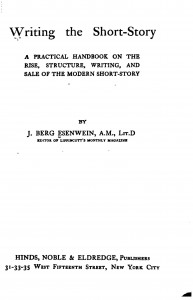Follow Scott
Recent Tweets
- Waiting for Twitter... Once Twitter is ready they will display my Tweets again.
Latest Photos
Search
Tags
anniversary Balticon birthdays Bryan Voltaggio Capclave comics Cons context-free comic book panel conventions DC Comics dreams Eating the Fantastic food garden horror Irene Vartanoff Len Wein Man v. Food Marie Severin Marvel Comics My Father my writing Nebula Awards Next restaurant obituaries old magazines Paris Review Readercon rejection slips San Diego Comic-Con Scarecrow science fiction Science Fiction Age Sharon Moody Stan Lee Stoker Awards StokerCon Superman ukulele Video Why Not Say What Happened Worldcon World Fantasy Convention World Horror Convention zombies
©2025 Scott Edelman
Writing advice from 1908—Part I
Posted by: Scott
Tags:
old magazines
Posted date:
February 9, 2008 |
No comment
One hundred years ago, Hinds, Noble & Eldredge published Writing the Short-Story: A Practical Handbook on the Rise, Structure, Writing and Sale of the Modern Short-Story, by Dr. J. Berg Esenwein, editor of Lippincott’s Monthly magazine.
I’ve already shared Esenwein’s magazine ad soliciting students for his correspondence school. Now let’s travel back to 1908 to absorb some of the good doctor’s practical advice on how to crack the short-story markets of his day!
Must I typewrite my story?
You need not, but you ought to. Hand-script is difficult to read at best and irritates your very busy judge; the manuscript reader cannot give full attention to your fiction if the act of reading becomes laborious; unconsciously he regards hand-script as the sign manual of inexperience; and lastly, it is much easier for you and for the editor to gain a complete impression of a typed story than of one which must be read slowly and whose script conveys no suggestion as to its final appearance on the printed page.
Neatness counts for as much in a manuscript as clean cuffs on a salesman. If you must revise the typed copy, do it with the same color of ink as that of the typewritten page. An unabridged dictionary will give you a list of proofreader’s marks.
Be sure to use double space in typewriting. You have no idea how appalling it is to face a long story, badly typed, on poor paper, and every line huddled between two others.
Keep your typewriting machine in good order, clean out the types, and see to it that no inadvertent marks are constantly being made on the paper to confuse the editor. Watch the paragraphing, correct the spelling, leave generous margins, and don’t use tissue paper.
The short-story is too short to warrant your dividing it into chapters. If breaks are needed, use Roman numerals or simply leave a blank line. …
Number (folio) your pages consecutively.
Most literary agencies, and a few authors, cover and bind their manuscripts by cutting a piece of heavy paper, dark and not easily torn, to a size 12 x 8 1/2. The entire back of the manuscript is covered, the extra inch folded over the top, and the whole riveted through the top margin. In typing your story be careful to leave enough margin so that the binding edge may not hide any part of the top line, or even make it hard to read. The first page may be kept clean by adding an extra sheet of letter-paper bearing precisely the same wording as you place at the top of the title page.
Some editors prefer loose-leaved manuscripts, but no one seriously objects to bound manuscript if the pages can be handled with perfect ease and without danger of tearing, so do not pin your manuscript or use any freak type of binding or stitching that is not substantial, and is likely to cause you extra labor in the end.
In a word, do all you can to make it easy for the publisher’s reader to pass upon your story. Of two stories of equal merit he will surely lean toward the one which has unconsciously pleased his eye. I have known it to be actually restful to turn to a neat, plain, clearly-written manuscript after being tortured into a headache by its opposite.

